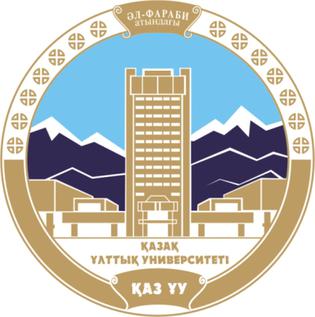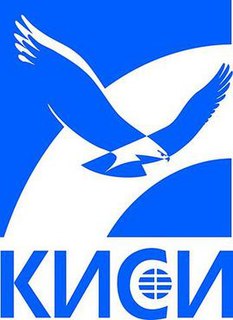The spread of telecommunications services in Tajikistan – telephony, radio, television and internet – has not been as extensive as in many other countries.

Pavlodar is a city in northeastern Kazakhstan and the capital of Pavlodar Region. It is located 450 km northeast of the national capital Nur-Sultan and 405 km southeast of the Russian city of Omsk along the Irtysh River. As of 2010, the city had a population of 331,710. The population of Pavlodar is composed predominantly of ethnic Kazakhs and Russians, with significant Ukrainian, German and Tatar minorities. The city is served by Pavlodar Airport.
A national research and education network (NREN) is a specialised internet service provider dedicated to supporting the needs of the research and education communities within a country.

Al-Farabi Kazakh National University , also called KazGU or KazNU, is a university in Almaty, Kazakhstan. Named after the Eastern philosopher and scholar al-Farabi, it is one of the country's largest universities.
KazSat-1 is the first Kazakh communications satellite. It was launched on 17 June 2006, at 22:44:05 UTC by Proton-K / Blok DM-2M launch vehicle.] This satellite was constructed by Khrunichev State Research and Production Space Center for the satellite bus and Thales Alenia Space (Italy) for the payload. Thales Alenia Space is also the provider of KazSat-2 and KazSat-3 payloads.
Kazpost is the national postal service of Kazakhstan.

KazMunayGas (KMG) is the state-owned oil and gas company of Kazakhstan. It was founded in 2002 by merging Kazakhoil and Oil and Gas Transportation.
The Kazakhstan–China oil pipeline is China's first direct oil import pipeline allowing oil import from Central Asia. It runs from Kazakhstan's Caspian shore to Xinjiang in China. The pipeline is owned by the China National Petroleum Corporation (CNPC) and the Kazakh oil company KazMunayGas.

Kazakhstan owns large reserves of energy resources, and therefore the energy policy of Kazakhstan has influence over the world's overall energy supply. Although Kazakhstan has not described itself as an energy superpower, Kazakhstan's former president Nursultan Nazarbayev has claimed Kazakhstan will become a factor of energy security in Asia and Europe. Kazakhstan has a strategic geographical location to control oil and gas flows from Central Asia to East (China) and West.
Satbayev University is a technical university located in Almaty, Kazakhstan. The university is the oldest technical university in Kazakhstan, comprising 10 institutions and 27 departments.
Vladimir Sergeyevich Kim is a Kazakhstani businessman and billionaire who is the richest person in Kazakhstan. He made his wealth in Kazakhstan's notoriously corrupt natural resources sector. He owns a network of offshore companies.
KazTransOil JSC is the national oil transporter in Kazakhstan accounting to 53% of all oil transported in the country. The company operates more than 8000 km of oil pipelines and 3,140 km of water pipelines. KazTransOil is a subsidiary of KazMunayGas, the national oil and gas company of Kazakhstan.

Timur Askaruly Kulibayev is a Kazakh business oligarch and son-in-law of former Kazakh president Nursultan Nazarbayev. Kulibayev has held several positions in important state-owned enterprises that manage Kazakhstan's natural resources, and has immense influence over the country's hydrocarbon industry.
The Internet in Kazakhstan is growing rapidly. Between 2001 and 2005, the number of Internet users increased from 200,000 to 1 million. By 2007, Kazakhstan reported Internet penetration levels of 8.5 percent, rising to 12.4 percent in 2008 and 34.3% in 2010. By 2013, Kazakhstani officials reported Internet penetration levels of 62.2 percent, with about 10 million users. There are five first-tier ISPs with international Internet connections and approximately 100 second-tier ISPs that are purchasing Internet traffic from the first-tier ISPs. As of 2019, more than 75% of Kazakhstan's population have access to the internet, a figure well ahead of any other country in Central Asia.

Samruk-Kazyna, officially known as the National Welfare Fund "Samruk-Kazyna", is a sovereign wealth fund and joint stock company in Kazakhstan which owns, either in whole or in part, a number of major companies in the country. This includes the national rail and postal service, the state oil and gas company KazMunayGas, the state uranium company Kazatomprom, Air Astana, and others. The state is the sole shareholder of the fund.
The National Space Agency of the Republic of Kazakhstan, also known as KazCosmos, or KazKosmos, is Kazakhstan's national space agency, and was officially established on 27 March 2007.
Kazakh-British Technical University, or KBTU is a research and educational institution located in Almaty, Kazakhstan. It was founded in 2001.

The Kazakhstan Institute for Strategic Studies under the President of Kazakhstan (KazISS) is a Kazakhstan state institution aimed at providing research and analytical support to the President of Kazakhstan and his government. The KazISS provides research related to international and domestic affairs as well as the social and economic development of Kazakhstan. The KazISS aims to provide predictive research and analysis for the country's leadership.
KazSat-3 is a telecommunications satellite which was launched 28 April 2014 at 04:25:00 UTC from Cosmodrome Baikonur in Kazakhstan. with a Proton-M launch vehicle.
The space program of Kazakhstan is originated from the dissolution of the Soviet Union in 1991, when Kazakhstan declared their independence. The Kazakh space program consist of cosmonaut and satellite missions. The only launch site situated at Kazakhstan is Baikonur Cosmodrome, which is leased to Russia. The program is led by KazCosmos since 2007.







